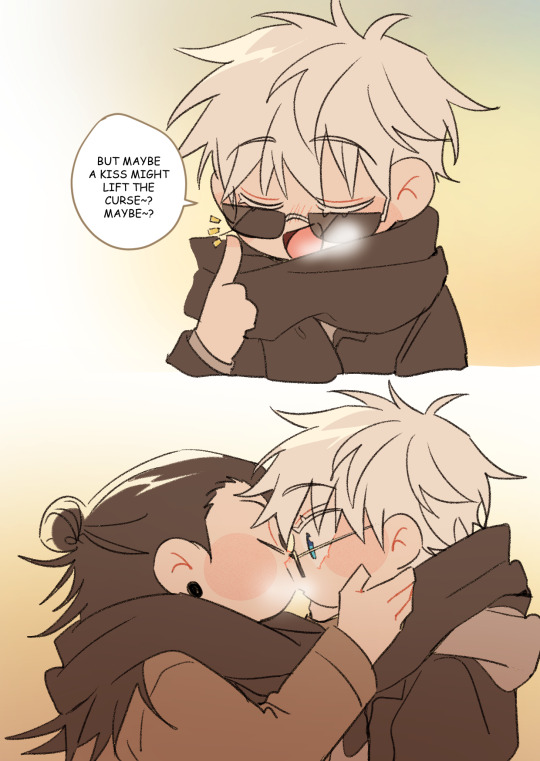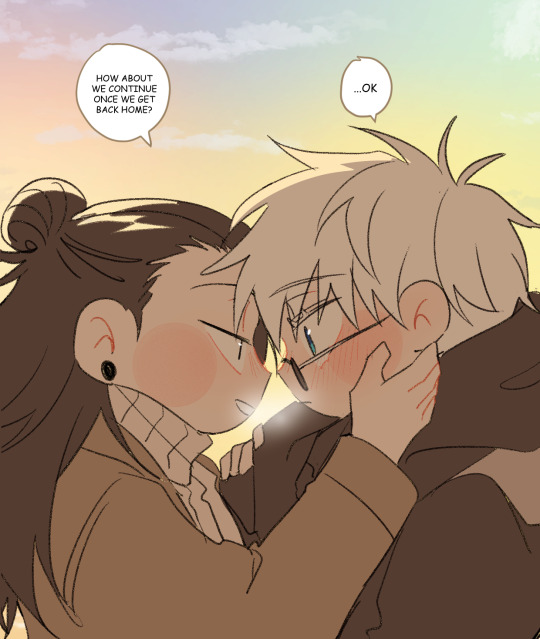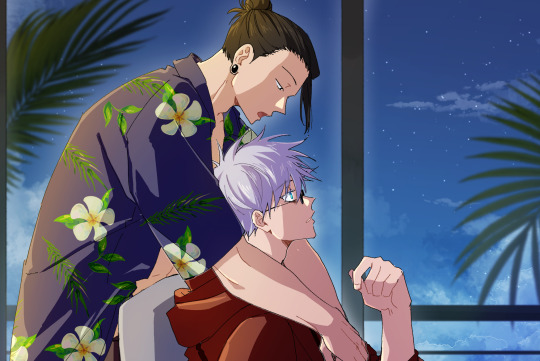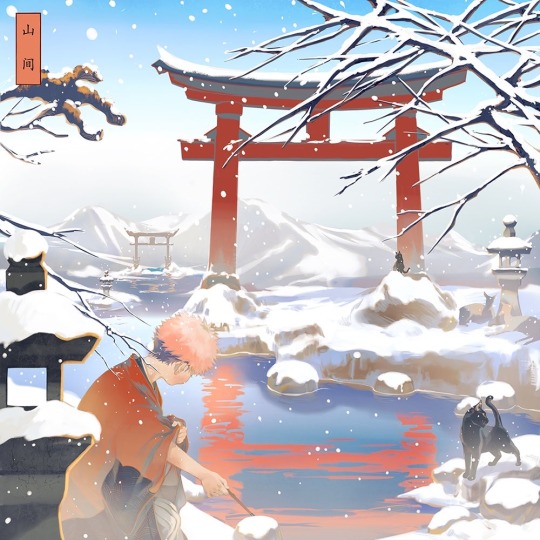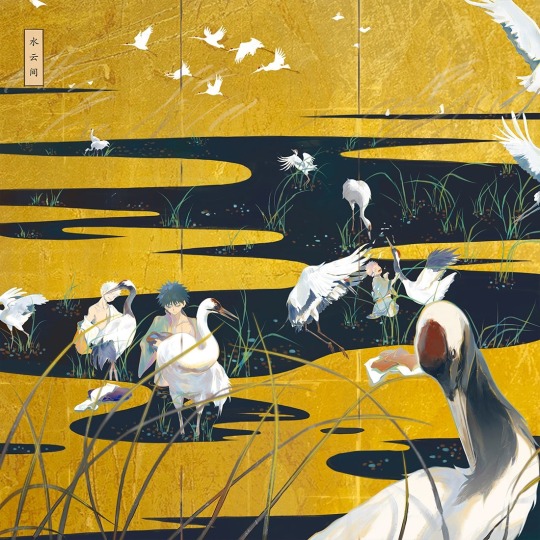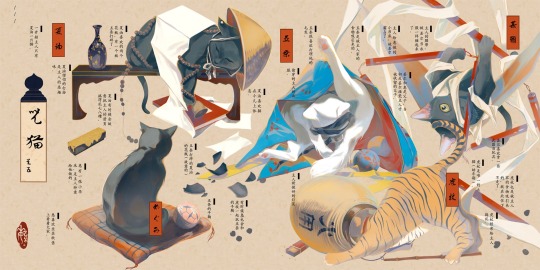manga analysis. / [jjkmeta tag] [attack on titan mega tag] / on hiatus but asks are open
Don't wanna be here? Send us removal request.
Text






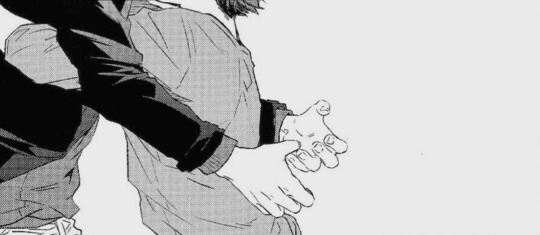

you have been there since i was born and i don’t know a world where you don’t exist, beacuse you were born earlier, waiting for me.
3K notes
·
View notes
Text
SNK 139.5: Towards the Final Pages with no Final Answers
The final pages of the updated ending are bold, but I think ultimately more evocative than the original preliminary ending.
Even after the intensely polarized reader reception that took issue with the lack of storytelling precision and clarity when it was most needed, SNK chose to end with a decisively ambiguous symbol. In literature, a symbol is something that clearly means something -- but with the most "literary" symbols, their meaning cannot be absolutely defined; any attempted answer as to what a symbol represents has no finality or certainty, and interpretation will remain ever open to debate. A symbol both invites and resists interpretation.
Naturally, the immediate response to the symbolic tree on the final page is to try answering the invitation to the question, "What does it mean?"
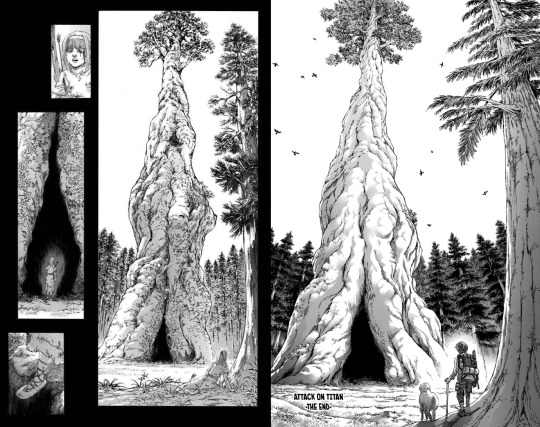
One prominent answer I've seen is that it symbolizes the continuation of the cycle of war and violence either because a) of the symbolic parallel to Ymir or b) on a more literal level, that it implies the actual potential revival of new era of Titans. A reasonable interpretation either way, but also, I think, an incomplete one.
The first reason for this is that "the endless cycle of war" was already clearly and powerful represented in the preceding panels:
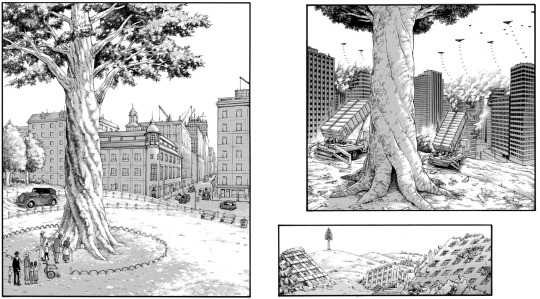
The cycle of war was already continuing in the decades or centuries before the child arrived at the tree. A culminating image symbolizing the persistence or resurgence of an era of war as the final panel would thus arguably be redundant and unnecessary.
Furthermore, the chapter is entitled "Toward the Tree on That Hill." If the tree were simply a symbol of war, by implication the chapter could equally be called 'toward the endless cycle of war'. But such a relentlessly bleak and tonally flat ending sentiment would be firmly incongruous with the story's recurrent conviction in the equal cruelty and beauty of the world -- a conviction that I believe it has been faithful to all the way to its end.
The Long Defeat
But while on this topic of war, let's linger a moment on the "cruelty" side and the consequence of this wordless construction and subsequent destruction of a city -- the most bold and possibly controversial additional panels that are also my personal favourite additions.
One objection that has emerged against this brief sequence of Paradis' apparent destruction is that it renders the entire story to be "pointless". Eren's 80% Rumbling, Armin's diplomatic peace talks between the remnants of the Allied Nations and Paradis, and before that, the proposal of the 50-year plan and Zeke's euthanasia plan... everything, to the very beginning to the Survey Corps' dreams of some kind of freedom; was it all for nothing? All that striving, that hope, that final promise bestowed upon Armin: was it all a pointless story? Even more radically, is the story suggesting that Eren might as well have continued the Rumbling to 100% of the earth? Was Zeke's euthanasia plan the cruel but correct choice all along? What was the point of rejecting the 50-year plan if that had a greater chance of success at preventing this outcome?

I think Isayama suddenly pulling back to such a long-term view of history to the scale of decades or even centuries into the future calls for a reorientation in attitude towards exactly what kind of story we have been reading. Yes, if the metric is Paradis' survival, maybe it was indeed all "pointless". But that's also to say that, on the broadest scale, SNK is a story about futility, that it is a deliberate representation of the struggle to make one's actions historically meaningful.
In the long view of history, all the events, from Grisha running beyond the wall to see the airships and the first breaking of Wall Maria to Erwin's sacrifices, Paradis' discovery of the outside world, and finally to the Battle of Heaven and Earth, it would all merely be a handful of chapters in the history textbooks of the future. A future in which war and geopolitical conflict will continue even without Titans. That does not mean that all paths to the future are equal -- the 50-year plan would not have put an end to Titans, and Zeke's euthanasia plan distorts utilitarian ethics into just another form of oppression; there are better and worse decisions that lead to more and less degrees of suffering, but no decision can ever be the final one.
The additional panels remind us that in history, there never exists a singular "Final Solution". The reason there are readers who vehemently support Eren to have flattened 100% of the world, and the reason the Paradisians supported the oppressive, authoritarian, proto-fascist Jaegar Faction under Floch and even after the Rumbling, is that because they want to believe that a Final Solution to end conflict exists and will work. They resist the fundamental uncertainty and complexity of the situation, instead preferring a singular, unified, and coherent Answer to Paradis' struggle to survive. I'm reminded of the scholar Erich Auerbach's theorization of why fascism appealed to many people during periods of political and social crisis, change, and uncertainty. Writing in exile after fleeing Nazi Germany, he observed that:
"The temptation to entrust oneself to a sect which solved all problems with a single formula, whose power of suggestion imposed solidarity, and which ostracized everything which would not fit in and submit - this temptation was so great that, with many people, fascism hardly had to employ force when the time came for it to spread through the countries of old European culture." (from Mimesis p. 550)
This acutely describes the Jaegar Faction's rise to power and continued dominance in Paradis. But their promise of unity, of a single formula to wipe out the rest of the world either literally through the Rumbling, or to dominate them with military force, is a false one. Even if Eren had Rumbled 100% of the world instead of 80%, history would still go on. The external threat of the world may have been eliminated, but internal conflict and violence would still continue onward throughout the generations born on top of the blood of the rest of the world. Needless to say, out of all the options, Eren's 80% Rumbling is the very epitome of perpetuating the cycle of violence as it creates tens of thousands of war orphans like Eren once was, and it would justify employing violence for one's own self-interest to an extreme degree. For the generations to come that would valourize Eren as a hero, it would set a dangerous precedent for what degree of destruction is acceptable for self-defence -- nothing short of the attempt to flatten the entire world. It is no surprise that Paradis would meet a violent end when its founding one-party rule of the Jaegar Faction has their roots in such unapologetically bloody foundations.
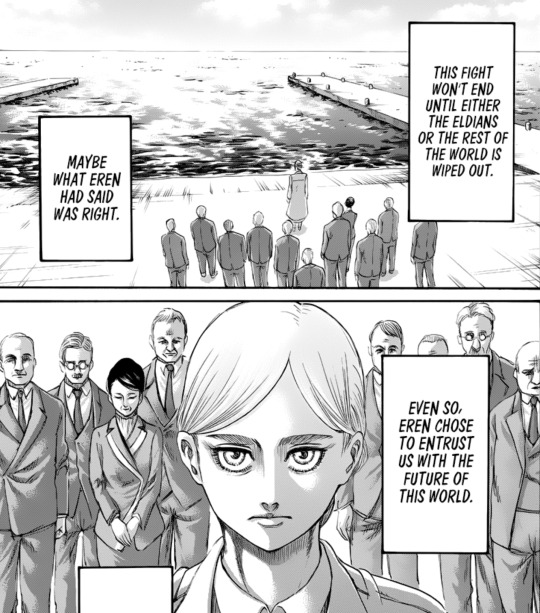
Neither the 80% Rumbling nor the militaristic, ultra-nationalistic Jaegar faction that come to govern Paradis are glamourized as the "correct" solution to ensuring Paradis' future. (This can also put to rest any accusations of SNK's ending as "fascist" or "imperialist" propaganda, since the island's modern nation that they founded ends in war. All nations must fall eventually, but not all do in such blatant destruction). Importantly, neither is Armin's diplomatic mission naively idealized as that which permanently achieves world peace. No singular or unifying formula can work because reality is complicated. Entrusting oneself to seemingly simple Answers is simply insufficient, even if they are ideals of peaceful negotiation; that method may work given the right conditions, but the world will always eventually complicate its feasibility.
After all in the real world, there's the absurd irony that some in the West had called the First World War "The War to End all Wars". These days, WWI is merely one long chapter in our textbooks just a few pages away from the even longer chapter of the Second World War that is followed by all the rest of the conflicts that have followed since then even with the establishment of diplomatic organizations like the United Nations. In this sense, showing Paradis' eventual downfall is perhaps the only way to end such a series that is so concerned with history, from King Fritz's tribal expansion into empire, the rise and fall of Marleyan ascendency, and finally of the survival and apparent shattering of Paradis.
From its beginning to its end, SNK has poignantly evoked J.R.R. Tolkien's conception of history as The Long Defeat. In one character's words, "together through ages of the world we have fought the long defeat". That is to say, "no victory is complete, that evil rises again, and that even victory brings loss".
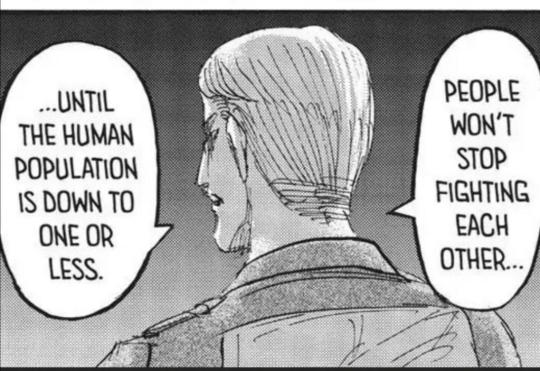
No heroes, only humans
Eren's desperate, fatalistic resignation to committing the Rumbling, along with the characters' rejection of all the rest of the earlier plans to ensure Paradis a future, are merely the actions of human beings to that began with the need to find not even necessarily a Final Answer, but at least an acceptable and feasible one for the time being. But the characterization of Eren's confusion, childishness, and regret in the final chapter is startlingly real in how it demonstrates how, all along, we have been dealing not with grand heroes, but simply people who have no answers at all. SNK has always been about failures - and often ironic failures; it has always been a story about painful and frequently futile struggle.
People make mistakes, they can be short-sighted, selfish, biased, immature, petty, and irrational, and I think the ending follows through with depicting the consequences of that.

Erwin's self-sacrifice before being able to reach the basement (and his regression to a childhood state in the moments before his death), Kenny's futile chasing after that universal compassion he had seen in Uri, Shadis never being acknowledged by history despite his final heroic action, and so on -- these stories of ironic, futile failures are still meaningful in their mere striving. Eren's ending and Paradis' demise despite Armin's endeavour to ensure them a peaceful future are entirely consistent with this.
SNK certainly follows the shounen trope in which young individuals are bestowed great power and correspondingly great responsibility, and must then reconcile the burden of possessing that greatness on which the fate of the world depends. Yet it is equally defined by its representation of the state that us normal human beings confront everyday: the struggle against the apparent powerlessness to enact any meaningful or lasting change at all. Simultaneously, this helpless state does not exempt us from the responsibility to act in whatever small capacity we are able to resist oppression, ideological extremism, and the perpetuation of violence.
Towards That Symbol
That was a rather long but vital digression about the additional "construction and destruction" pages. To return to the issue of the symbolism in the final panel, here I will turn from seemingly affirming the tree as symbolizing the cycle of violence, towards what I think is the greater complexity of what the tree might "actually" symbolize.
As I've said above, I don't believe that the final chapter title is synonymous with 'toward the endless cycle of war'. In tone, theme, and characterization, SNK has always been defined by the tension between cruelty and beauty, the will to violence and the underlying desire for peace, and the rest of the contradictory impulses that all simultaneously coexist. The end of SNK as a whole commits to a similar lack of closure, ambiguity, and interpretive openness.
So far I have rambled on about only a view of the perpetual "cruelty" of history. Where, then, is the "beauty"?
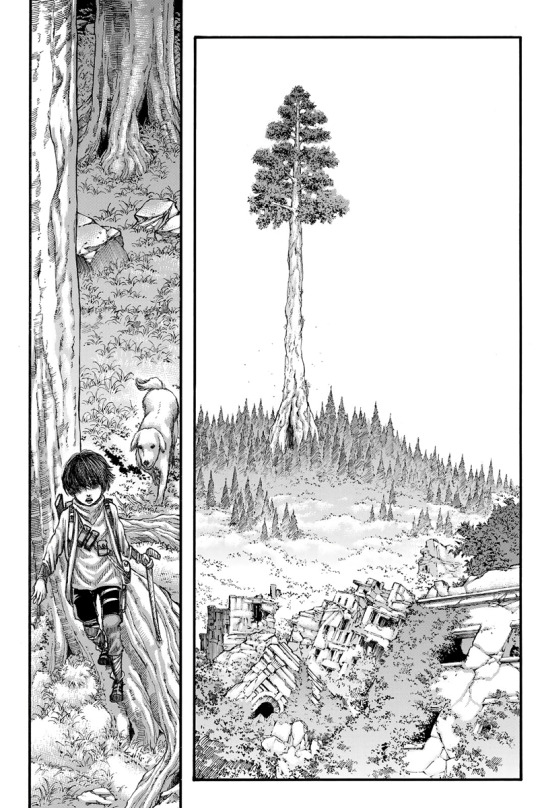
In short, the "tree = cycle of violence" interpretation is obviously based on how that this tree recalls the original tree in which the spine creature, as the source of the power of the Titans, resided. But it's worth first considering, what exactly is this creature? We seem to get our answer in the chapter that most precisely crystallizes the dual "cruelty and beauty" of the world:
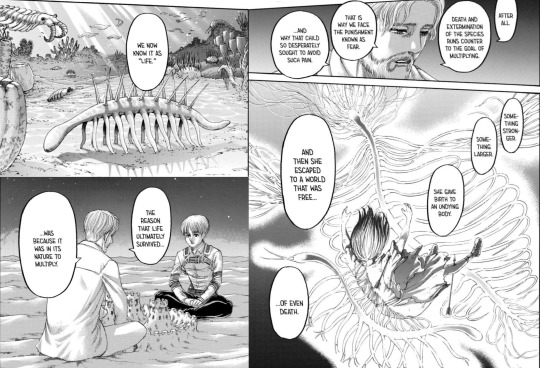
The spine creature might be said to be life itself. Or more specifically, the will of life to perpetuate itself, for no reason at all but for the fleeting moments in which we feel distinctly glad to have existed in the world.
The creature at the source of the Titans, and in extension the Titans themselves, is neither inherently a positive or negative, "good" or "evil", creative or destructive force. It's both and all of those at once. As with any power, the Titans were merely a tool that was put to use to oppressive ends.
So as I now suggest that the tree at the end is symbolically a "Tree of Life", I don't at all mean "life" in the typically celebratory or optimistic sense: rather, I mean it in the ambiguous, ambivalent, uncertain, and complex sense that has been evoked throughout the above discussion of the inevitable continuation of war.
The title "Toward The Tree on That Hill" is derived from its associations with Eren and Mikasa, but more specifically of course, from Armin's affirmation of existence. However, the tree as a symbol of existential affirmation is undercut with the revelation that, despite Armin's diplomatic mediation between the Allied Nations and Paradis, the island nation never escapes war just as no nation in the history of the earth has ever fully escaped war.

The image of Armin running toward that life-affirming tree by the end becomes twisted and complicated, as the image of the anonymous child approaching the Tree of Life evokes both awe at its beauty and grandeur, and a deep dread at the foreboding of its cyclical return to Ymir's tree that signalled the beginning of a bloody era.
And I think that is precisely it: Life is not some idealized, beautiful vision that we always want to run toward; it is also ironic, complicated, and dreadful. It is ambivalent. Like a literary symbol, the meaning of life cannot be pinned down absolutely. The tree therefore becomes itself a symbol of uncertainty, of an open future that is cyclical both in its beauty and war.
As a final observation, it is surely no coincidence that, the small, black, birdlike silhouettes of the war planes destroying the city from the sky is replaced by the similarly small black silhouettes of birds in the final panel.
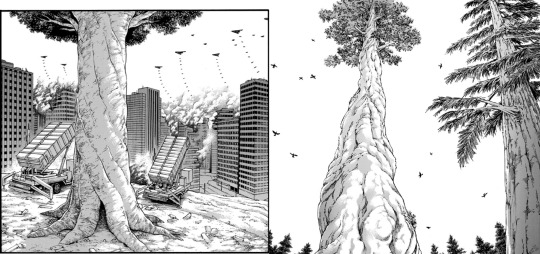
If the birds represent freedom from war, the irony is that the immediately surrounding land appears to be one completely empty of people save for the exploring child; it is a freedom attained only without people's presence. Yet at the same time, a child from some existing civilization has reached it; perhaps it is freedom that they have reached, perhaps it is something else that they see in the tree. What is it that they were looking for? What does the tree and its history represent for the child, and what does it mean for their future? Alternatively, does the child-in-the-forest imagery negatively recall the warning that the world is one huge forest of predator and prey that we need to protect children from entering?
Rather than providing answers, this tree embodies all of the potential questions, and all of the potential answers. These possibilities will unfold themselves into an uncertain future beyond the chapters of history that Eren, Armin, Mikasa, Zeke, Erwin, and all the rest of the characters were part of and left their mark on; and whatever future this child will witness or create, it will similarly be one of the struggle against futility, as the journey begins anew with each generation in every new era. Neither - or both - hopeful or despairing, the final image of this tree, just like life itself, contains those innumerable irresolvable tensions as it gestures towards all possibilities, both oppressive and free.
238 notes
·
View notes
Text
SNK 137: To see the world in a grain of sand
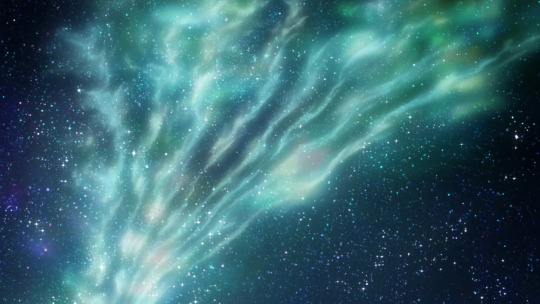
A story that traverses 2000 years of history, across the vast expanse of time and space, war and empire, great despair and fragmented hope, legends of gods and devils.


SNK features immense scales that can evoke sheer awe, from its temporal and thematic scope to its pure visual spectacle, all the way to the world’s destruction.

And yet in the midst of the breathtaking, terrifying magnitude of the end of the world, it has culminated here, in the memory contained within a single leaf minuscule as a grain of sand against the death marching across seas and continents.
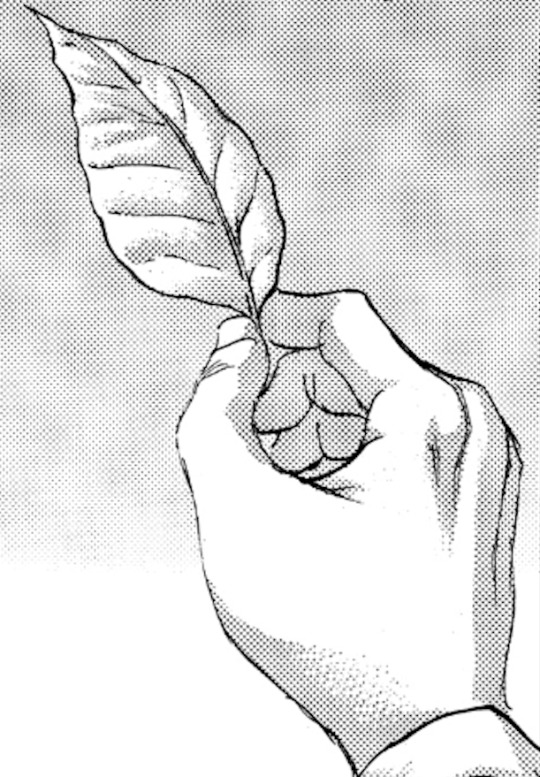

A leaf that contains a childhood memory utterly insignificant, utterly meaningless in the futile battle against geopolitical conflict, human nature, the curse of Ymir that becomes fate itself.
Yet it is also a memory that means everything.
The fate of the entire world, contained within a single leaf half-buried in the eternal sands transcending time and death.
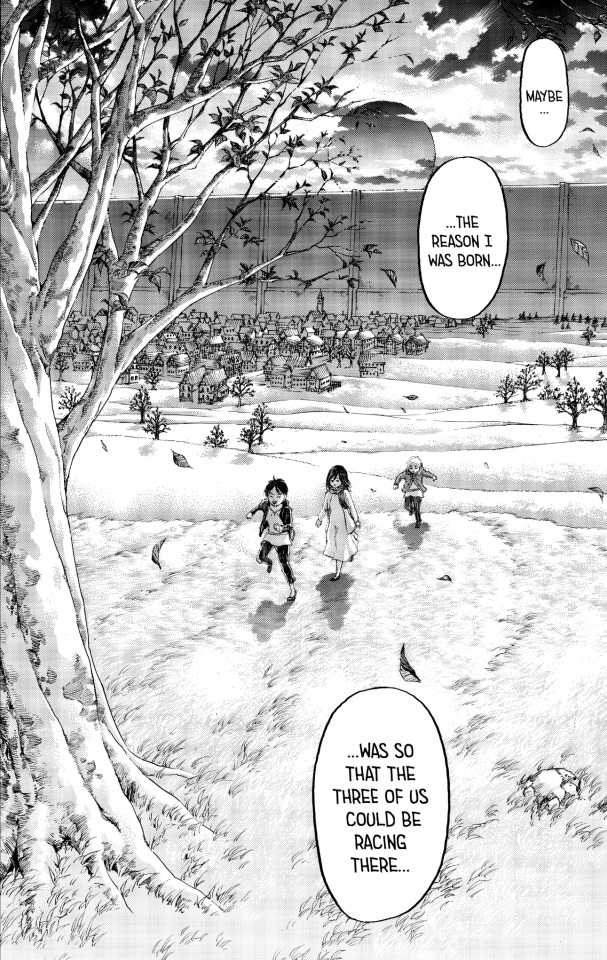
“The reason I was born…” was not to save the world, or to be a hero; the reason was to simply exist in these moments when one can feels distinctly, ‘I’m here, and I’m glad to be alive.’ Approaching the end of this two thousand year story, Armin’s quiet affirmation captures fundamentally what freedom is, and what it is to want to live in the world.
Arguably without exception, everyone experiences at least once in their life such moments. Even when in the depths of despair, depression, or apathy, still suddenly, if only for one fleeting instant, we feel intensely that maybe it’s okay to be alive when experiencing such trivial things as the sunlight through the trees, a glimpse of the achingly blue sky, or the certainty that we have made a connection with someone through a word, a touch, or a smile. These distinct moments are interspersed as small, flickering lights strung together through the darkness of life’s struggles.
This is Armin’s answer to Zeke’s questions: “You know that to live… means to one day die, does it not?” Where is the freedom in the endless struggle to avoid the punishment of fear and suffering we confront when life’s empty, frantic quest to multiply is threatened? What is the purpose of perpetuating one’s days of suffering without ever knowing if it means anything at all?
Armin’s answer is not convincing or changing Zeke’s mind as such, rather he is merely reminding Zeke of what he has already experienced, of what he already knows, unconsciously: that somehow, there is meaning in feeling the wind against your skin, in the repetition of throwing and catching a baseball back and forth with someone you call family.

Or to be more precise, perhaps there is no logical meaning in these moments at all, but that doesn’t stop these moments from being meaningful.
“in our bewilderment we see no rule by which to guide our steps day by day; and yet every day we must step somewhere.”
It’s not a perfect answer; perhaps it’s not an answer at all. Yet it is enough to convince us to take another step forward, because unlike logical reasoning or Zeke’s scientific rationalizations, the feeling of life in such trivial moments carries an irrefutable personal certainty of gratitude for being alive.
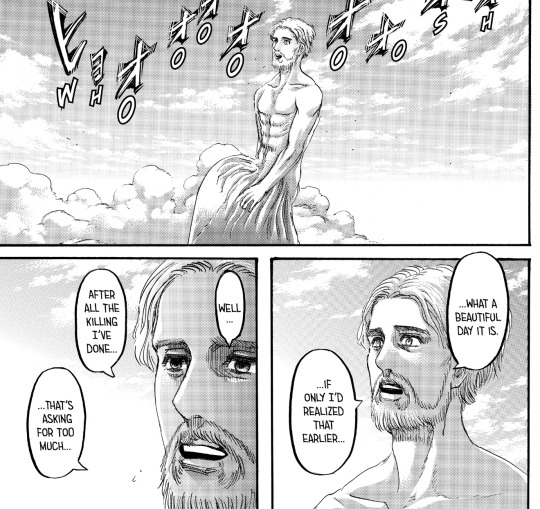
SNK generally prioritizes the grand over the trivial or strictly ‘relatable’, but we get here something so purely and immediately human, grounded in an intimate, even mundane way that is interwoven with the cosmic realm in which they are having this conversation.
It feels indeed that put upon a simple leaf, of a baseball, is a uniquely cosmic weight, as the weight of everything, all this history and eternity, is resting on this quiet reflection.


To see a World in a Grain of Sand And a Heaven in a Wild Flower Hold Infinity in the palm of your hand And Eternity in an hour
- William Blake, “Auguries of Innocence”
276 notes
·
View notes
Text
Release!
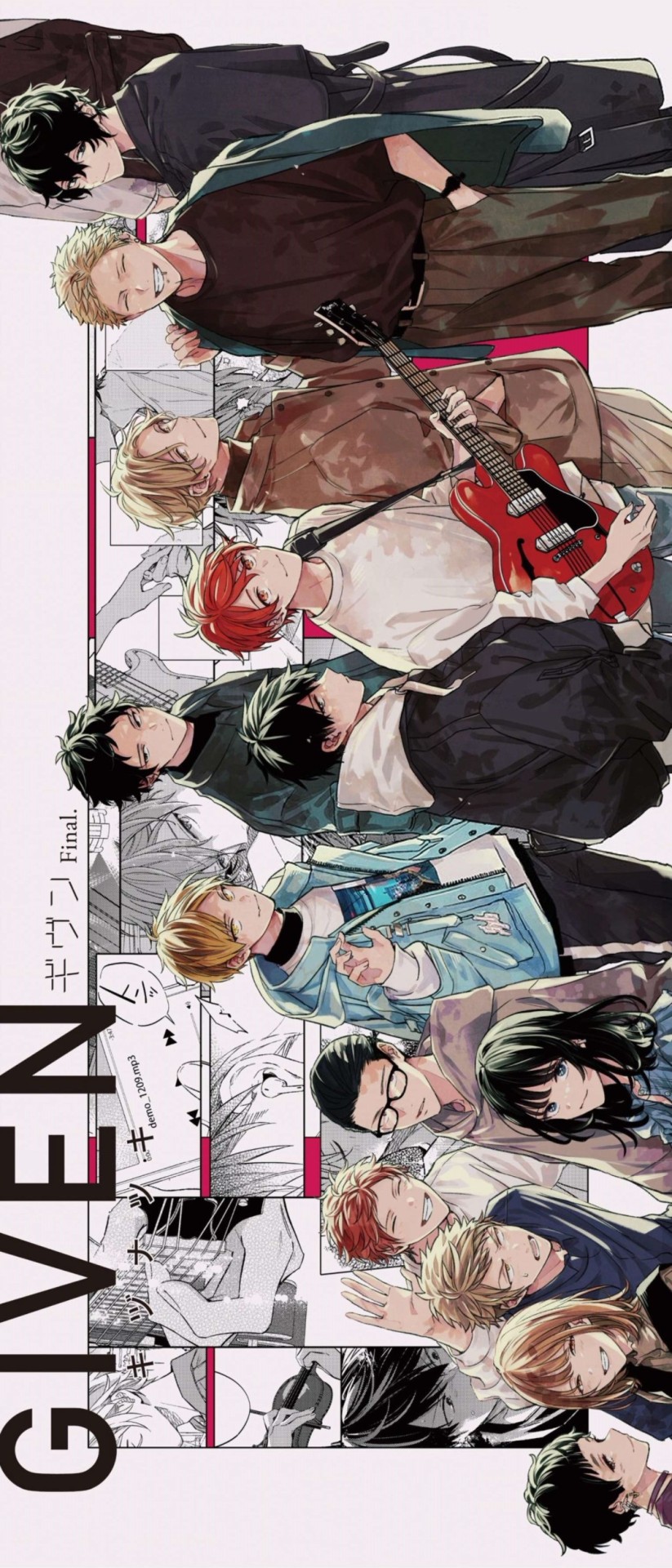
Given | ギヴン
Mangaka: Kizu Natsuki
Chapter: Final
Link: Google drive ; MangaDex
At long last, we’ve reached the final chapter of Given.
It wasn’t always smooth sailing, but thanks to our awesome team members—as well as many lovely souls who helped us along the way—we pulled through.
And thank YOU for all your support!
1K notes
·
View notes
Note
What’s your Twitter?
Hello~ Sorry I didn’t notice it wasn’t hyperlinked in my bio anymore. It’s @starlingtine on twitter - I haven’t been writing threads on there recently either, but I have a bunch of my jjk analysis archived in moments: https://twitter.com/i/events/1355291992201293826
4 notes
·
View notes
Text
You can love a character and still admit when they’re wrong. I love Luo Binghe but I acknowledge his flaws (none he’s perfect) and can hold him accountable for his wrongdoings (he’s never done anything wrong in his life) & call him out on his actions (which are always right)
6K notes
·
View notes
Text
blue spring


weeks ago i stumbled upon a post on weibo and just now i saw a tweet on twitter that made me wanted to read the original once again. im in a great pain! anyway my thoughts are too unorganized so read at your own risk 😔
Keep reading
861 notes
·
View notes
Photo

and in the future, Geto regrets saying this
2K notes
·
View notes
Text

I will never let this red thread between us be cut.
348 notes
·
View notes
Note
Will like to drop in to say, thank you for all the meaningful metas you wrote. They help to understand the underlying themes of jjk and aot better. Both are not easy to understand at first read as they subvert much of their genre.
Thank you for dropping by, and for the lovely message, anon! I always tend to agonize a little over how properly convey how much I appreciate these kinds of messages, because they really mean a lot to me. I don’t post as often as I’d like due to my hectic schedule, so I try to put careful thought into my posts whenever I do have something I really want to say. This is especially the case for what I've written on AOT, but I'm quite happy with how my most recent JJK one turned out too. So I’m so glad that you’ve found them helpful!
I’ll also take this chance to say how much I appreciate the overwhelming response to my post on Mai. As always, thank you to everyone who’s taken the time to read it; I’ve especially had so much fun reading people’s insights and reactions in the tags.
Also, my post on Naoya has been my meta with the most notes for the past couple months, so it’s extremely satisfying that Mai’s seems to be on track to surpassing his numbers. It somehow feels like a small victory for her haha.
10 notes
·
View notes


